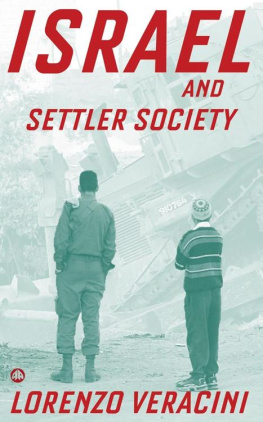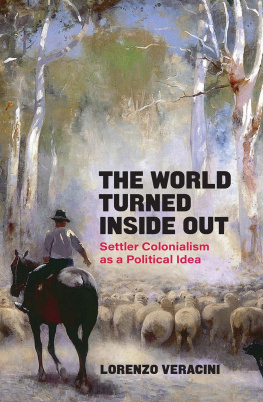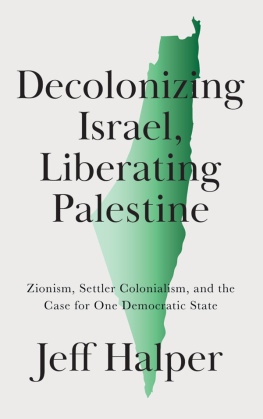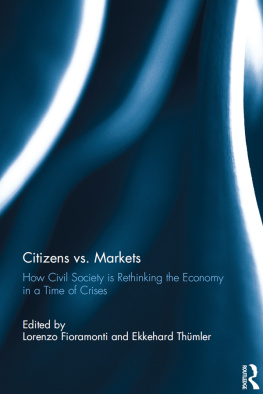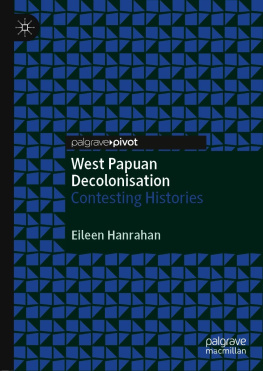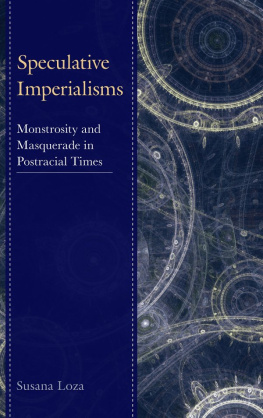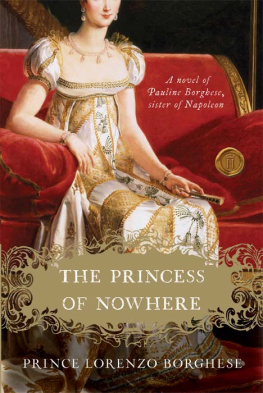Lorenzo Veracini - Israel and Settler Society
Here you can read online Lorenzo Veracini - Israel and Settler Society full text of the book (entire story) in english for free. Download pdf and epub, get meaning, cover and reviews about this ebook. year: 2006, publisher: Pluto Press, genre: Politics. Description of the work, (preface) as well as reviews are available. Best literature library LitArk.com created for fans of good reading and offers a wide selection of genres:
Romance novel
Science fiction
Adventure
Detective
Science
History
Home and family
Prose
Art
Politics
Computer
Non-fiction
Religion
Business
Children
Humor
Choose a favorite category and find really read worthwhile books. Enjoy immersion in the world of imagination, feel the emotions of the characters or learn something new for yourself, make an fascinating discovery.
- Book:Israel and Settler Society
- Author:
- Publisher:Pluto Press
- Genre:
- Year:2006
- Rating:5 / 5
- Favourites:Add to favourites
- Your mark:
- 100
- 1
- 2
- 3
- 4
- 5
Israel and Settler Society: summary, description and annotation
We offer to read an annotation, description, summary or preface (depends on what the author of the book "Israel and Settler Society" wrote himself). If you haven't found the necessary information about the book — write in the comments, we will try to find it.
Israel and Settler Society — read online for free the complete book (whole text) full work
Below is the text of the book, divided by pages. System saving the place of the last page read, allows you to conveniently read the book "Israel and Settler Society" online for free, without having to search again every time where you left off. Put a bookmark, and you can go to the page where you finished reading at any time.
Font size:
Interval:
Bookmark:

Israel and
Settler Society
Lorenzo Veracini

First published 2006 by Pluto Press
345 Archway Road, London N6 5AA
and 839 Greene Street, Ann Arbor, MI 48106
www.plutobooks.com
Copyright Lorenzo Veracini 2006
The right of Lorenzo Veracini to be identified as the author of this work has been asserted by him in accordance with the Copyright, Designs and Patents Act 1988.
British Library Cataloguing in Publication Data
A catalogue record for this book is available from the British Library
ISBN 0 7453 2501 7 hardback
ISBN 0 7453 2500 9 paperback
ISBN 9781783719181 ePub
ISBN 9781783719198 Kindle
Library of Congress Cataloging-in-Publication Data applied for
10 9 8 7 6 5 4 3 2 1
Designed and produced for Pluto Press by
Chase Publishing Services Ltd, Fortescue, Sidmouth, EX10 9QG, England
Typeset from disk by Stanford DTP Services, Northampton, England
Printed and bound in the European Union by
Antony Rowe Ltd, Chippenham and Eastbourne, England
Contents
1
Introduction: Comparing Colonial Conditions
T his book challenges two paradigmatic aspects of a wide historical literature: first, that the IsraeliPalestinian struggle is intractably unique and largely defies comparative approaches (Israel and Palestine are cited here in alphabetical order), and, second, that this struggle consists exclusively or mainly of a conflict of national/religious revival/liberation and bears little resemblance with typically colonial conflicts.
On the contrary, Israel and Settler Society approaches this conflict by utilizing a colonial framework of interpretation and a number of comparative test cases. Specifically, it develops the notion that the current circumstances of Israel/Palestine are determined by colonial conditions and a settler colonial system of institutional and personal relationships.Israel and Settler Society contends that the historical experience of Zionist development in Israel/Palestine meets both these definitions.
While this notion is hardly breaking new ground and the colonialist nature of Zionism as an historical enterprise is frequently mentioned Baruch Kimmerling, for example, published Zionism and Territory in 1983, and one should also mention Gershon Shafirs Land, Labor, and the Origins of the Israeli-Palestinian Conflict, which regarded Zionism as a form of European overseas expansion in a frontier region the paradigm with which the conflict is generally framed tends to discount the colonial genealogy and current phenomenology of the confrontation by foregrounding religious and nationalist features. As a result, the current colonial dimension of the conflict is not often examined in detail.
Many contributions refer to the fact that historical Zionism is essentially a colonial enterprise, albeit a unique one (yet again, as a comparative historian of colonialism, I cannot recall a colonial historiography that does not stress the stubborn uniqueness of its historical experience), and some of the debates over the new Israeli historiography in the 1990s involved a discussion of the colonial elements of Zionist settlement.
Although it focuses on Israel as a settler society, by emphasizing a colonial circumstance, Israel and Settler Society ultimately responds to what has become a pressing need to interpret Palestinian agency. There is a recurring and entrenched incapacity in otherwise subtle and highly informed analyses of the conflict to assess the rationale that informs some of the choices of the Palestinian resistance. I contend that a systematic disregard of the colonially determined characteristics of the Palestinian struggle contributes to a specific interpretative deficiency.
Israeli daily Haaretz analyst Yoel Marcus has brilliantly expressed this in an October 2004 piece entitled Get down from the roof you crazies. The background of Marcuss piece is an escalation in the launch of Qassam rockets from the northern sector of the Gaza Strip (Qassam rockets are almost homemade projectiles Palestinian militants shoot towards Israeli territory; however, their restricted range and low efficacy have improved with time); this escalation triggered the longest and deadliest offensive of the Israeli Defense Force (IDF) in Gaza. His article exemplifies an apparent interpretative impasse:
Now is the time to repeat the immortal words of Israels former finance minister, Yigal Horowitz, for the benefit of the Palestinians: Get down from the roof, you crazies! What is the matter with these people? Why, every time the door opens a crack for some Israeli compromise or concession, do they suddenly have this urge to maim and kill?
Why, after the Oslo Accords, which Israel went through hell and high water to approve, did they unleash a campaign of bloody terror, blowing up buses, shopping malls, cafes, restaurants and markets? Why did they go on an indiscriminate murder spree, butchering citizens of all ages? Why did they launch another wave of terror at the split second that another opportunity arose for a settlement brokered by President Clinton at Camp David? Why is every senior American peacemaker sent here to tie up the loose ends of some deal always greeted by a terror attack that sabotages the mission even before it begins?
None of this is any clearer today. Why, when the patriarch of the settlements decides in his old age to disengage from Gaza when he makes up his mind to clear out all inhabitants, businesses and military posts, and on top of that, evacuate four West Bank settlements to get the ball rolling have the Palestinians gone on a rampage? Why are they attacking, ambushing, and wildly shooting Qassam rockets at Sderot? I say Palestinians, and not Hamas, because the Palestinian Authority has more power and say-so than we think. If the PA didnt want Sderot bombarded, it wouldnt be.
Besides the debatable validity of some of its assumptions, the most striking feature of this approach seems to be a failure in detecting a rational agency informing Palestinian actions. Classic reflections on the nature of colonial circumstances can be of help. While Marcus does not appear to be interested in addressing an apparent and self-confessed interpretative gap, his posture resonates in many ways with the opaqueness of the colonized as it was identified by Albert Memmi in The Colonizer and the Colonized (1957):
The humanity of the colonized, rejected by the colonizer, becomes opaque. It is useless, he asserts, to try to forecast the colonizeds actions (They are unpredictable! With them, you never know!). It seems to him that strange and disturbing impulsiveness controls the colonized. The colonized must indeed be very strange, if he remains so mysterious after years of living with the colonizer.
Framed in this light, Marcuss rhetorical questions confirm a typically colonial state of mind:
What is the point of all this violence in the Gaza Strip? The accepted theory is that Hamas wants to take credit for expelling Israel, which it needs for internal political purposes. But Hamas doesnt need to kill women and children now that the prime minister has decided on his own to pull out of Gaza. Everyone knows Israel is taking the first step because it hasnt been able to eradicate terror by force. Israel withdrew unilaterally and unconditionally from Lebanon for the same reason. So Hamas and the Palestinian Authority can boast just as well about kicking us out of Gaza without starting a new cycle of bloodshed.
Font size:
Interval:
Bookmark:
Similar books «Israel and Settler Society»
Look at similar books to Israel and Settler Society. We have selected literature similar in name and meaning in the hope of providing readers with more options to find new, interesting, not yet read works.
Discussion, reviews of the book Israel and Settler Society and just readers' own opinions. Leave your comments, write what you think about the work, its meaning or the main characters. Specify what exactly you liked and what you didn't like, and why you think so.

